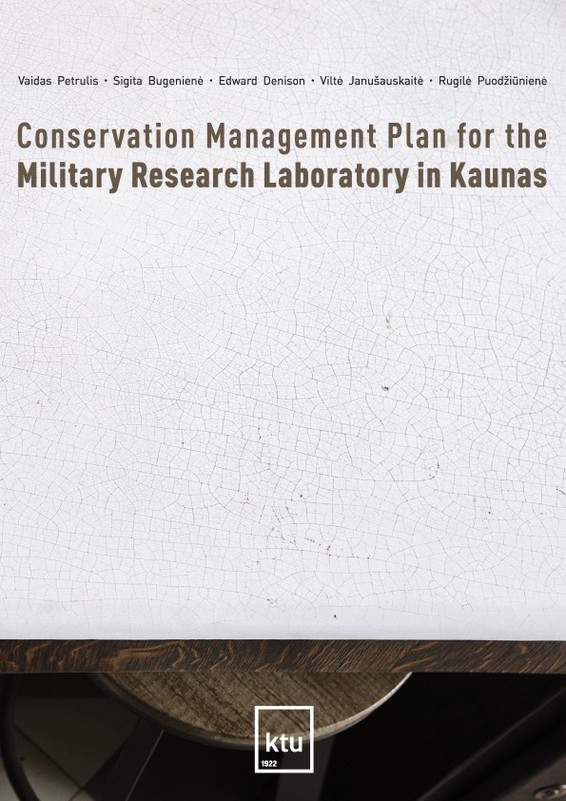
- Turime sandėlyje
- Autorius: Vaidas Petrulis, Sigita Bugenienė, Edward Denison, Viltė Janušauskaitė, Rugilė Puodžiūnienė
- Leidėjas: Technologija
- Metai: 2021
- Puslapiai: 328
- ISBN: 9786090217771
- Versijos kodas: 22-0090
- Formatas: 21,5 x 26,5 x 2,2 cm, minkšti viršeliai
- Kalba: Lietuvių
- Vertėjas: Jurgita Motiejūnienė
- Extra -10 % nuolaida šiai knygai su kodu IMU10
Conservation management plan for the military research laboratory in Kaunas + nemokamas atvežimas! | knygos.lt
Atsiliepimai
Aprašymas
The Military Research Laboratory, located in Kaunas, Lithuania, is a great manifestation of international modernist ideas and one of the most outstanding buildings of the interwar period in Lithuania and in the Baltic region. Designed by Vytautas Landsbergis-Žemkalnis (1893–1993), the famous Lithuanian architect, the Laboratory has become important not only to the city as a centre of progressive technical science, but also as the focal point of scientific development in the region. While the book concentrates on the study of the Laboratory, it is also intended address universal issues of the field of cultural heritage. The historical analysis of the building and its cultural and political context enhances the knowledge of the interwar architectural processes related to military facilities. A detailed study of the physical condition of the building, based on polychromic, chemical composition of plaster and paint, microbiological, and other instruments of physical analysis, significantly expands the knowledge on the material and technical possibilities of masonry construction in Lithuania and the region. And, finally, the recommendations made for the restoration and maintenance of the object are likely to be significant not only for the particular Laboratory, but also will give inspiration for the similar type of heritage. It is expected that the interdisciplinary study will serve as a case study for the preservation of other modernist structures in a region with a large amount of 20th century architecture. This is primarily aimed at owners of modernist architectural heritage sites, heritage conservationists, and at the same time specialists and enthusiasts of 20th century architectural history. The site as a unique example of modern military architecture in the Baltic Sea region may also be of interest to military historians.
EXTRA 10 % nuolaida
Kupono kodas: IMU10
Akcija baigiasi už 4d.15:51:45
Nuolaidos kodas galioja perkant nuo 10 €. Nuolaidos nesumuojamos.

- Autorius: Vaidas Petrulis, Sigita Bugenienė, Edward Denison, Viltė Janušauskaitė, Rugilė Puodžiūnienė
- Leidėjas: Technologija
- Metai: 2021
- Puslapiai: 328
- ISBN: 9786090217771
- Versijos kodas: 22-0090
- Formatas: 21,5 x 26,5 x 2,2 cm, minkšti viršeliai
- Kalba: Lietuvių
- Vertėjas: Jurgita Motiejūnienė
The Military Research Laboratory, located in Kaunas, Lithuania, is a great manifestation of international modernist ideas and one of the most outstanding buildings of the interwar period in Lithuania and in the Baltic region. Designed by Vytautas Landsbergis-Žemkalnis (1893–1993), the famous Lithuanian architect, the Laboratory has become important not only to the city as a centre of progressive technical science, but also as the focal point of scientific development in the region. While the book concentrates on the study of the Laboratory, it is also intended address universal issues of the field of cultural heritage. The historical analysis of the building and its cultural and political context enhances the knowledge of the interwar architectural processes related to military facilities. A detailed study of the physical condition of the building, based on polychromic, chemical composition of plaster and paint, microbiological, and other instruments of physical analysis, significantly expands the knowledge on the material and technical possibilities of masonry construction in Lithuania and the region. And, finally, the recommendations made for the restoration and maintenance of the object are likely to be significant not only for the particular Laboratory, but also will give inspiration for the similar type of heritage. It is expected that the interdisciplinary study will serve as a case study for the preservation of other modernist structures in a region with a large amount of 20th century architecture. This is primarily aimed at owners of modernist architectural heritage sites, heritage conservationists, and at the same time specialists and enthusiasts of 20th century architectural history. The site as a unique example of modern military architecture in the Baltic Sea region may also be of interest to military historians.




Atsiliepimai